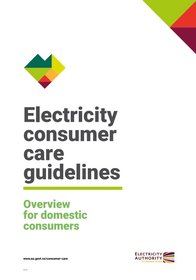Consumer care & medically dependent

Consumer Care Guidelines
Access to electricity is important for everyone. It's vital for our health, wellbeing, to connect with our community, family and friends.
We have Consumer Care Guidelines to encourage electricity companies to provide a consistent and supportive standard of service to you. We expect electricity companies to:
- adopt behaviours and processes that foster positive relationships with you
- help you maximise your potential to access and afford a constant electricity supply suitable for your needs
- help you minimise harm caused by insufficient access to electricity or by payment difficulties.
From 1 January 2025 the Consumer Care Obligations will be implemented. Two key protections will apply from 1 January 2025 and all protections will apply from 1 April 2025. This page will be updated soon with further details. See media release
What does this mean for you?
Electricity companies following the Consumer Care Guidelines will work with you to help access and afford a constant supply of electricity to meet your household's needs. Depending on your situation, your electricity company could:
- provide practical advice on your energy use and how to lower costs
- move you to a different or more suitable pricing plan or payment arrangement
- link you with a support agency for help.
The overall aim is to help you stay connected and avoid a build up of debt, while having access to the electricity you need. Whether you are experiencing difficulties now or can see them coming in the future, talk or respond to your electricity company as soon as possible so they can help you.
Are you medically dependent?
If you or a member of your household are medically dependent and rely on electricity to prevent serious harm to health, register as a 'medically dependent consumer' with your electricity company immediately. Find out more:
Does your health depend on electricity?
If you, or someone in your household is or could be medically dependent, you must let your electricity company know immediately and apply for 'medically dependent consumer' status. Contact them yourself or ask the account holder for your household to tell the power company on your behalf.
If you choose to switch to another electricity company, you will need to notify your new electricity company. They will not know you are medically dependent if you don’t tell them.
Power cuts happen from time to time in New Zealand, for many reasons. Even if you are medically dependent, a constant electricity supply cannot be guaranteed. Your health practitioner should agree an emergency response plan with you. This provides you with instructions on what to do to stay well if the electricity supply fails for any reason.
How to prove you’re medically dependent
- Consult a qualified health practitioner to discuss your situation. Qualified health practitioners include Te Whatu Ora Health NZ, private hospitals or GPs that have appropriate registration and qualifications.
- If you qualify as a medically dependent consumer, your health practitioner will give you a notice to pass to your electricity retailer as soon as possible. Keep a copy for yourself.
- This notice is called a Notice of Potential Medically Dependent Consumer Status (an HP notice), confirming your medically dependent status.
What to do in a power cut
- Follow your emergency response plan if the power cut puts you at risk of harm.
- Notify your electricity company immediately so they are aware you do not have an electricity supply.
- In a medical emergency, call 111.
Your power company's responsibilities
In their consumer care policy, your electricity company should list specific processes they have in place to minimise unexpected power cuts to medically dependent households, including:
- notifying any medically dependent consumer living in your household of any scheduled electrical outage so they can plan how to manage it
- planned outages should not be changed without the electricity company trying to let you know
- when emergency outages are required, efforts should be made to contact medically dependent consumers, if time permits.
Useful documents
-
Consumer Care Guidelines29 March 2021
-
Overview for health and support agencies7 December 2021
